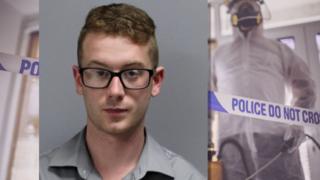


Image copyright
Tyler County Constable’s Workplace/ Getty
Mr Brandin’s photo launched by police.
Michael Lane Brandin understood his Facebook post would cause a stir.
What he didn’t realise was that he ‘d be apprehended, lose his task and face a trial that might see him behind bars.
It was an otherwise dull afternoon in March and the argument about how to cope with the possible outbreak of Covid-19 was all over his timeline.
So he chose to, in his words, “do a social experiment”.
Mr Brandin published that he had actually evaluated favorable for coronavirus. And after that he included that medical professionals had told him the infection was now airborne.
That would imply it had unexpectedly become far easier to catch it than by just being too near to an infected individual who coughs or sneezes in your basic direction.
However he had made it up.
Image copyright
Michael Brandin
Michael Lane Brandin states he was attempting a “social experiment”.
Mr Brandin says his point was to demonstrate that you can’t constantly think everything you read online.
On Facebook, he was met compassion and shock. “I had several reactions,” he says. “A great deal of buddies messaged me to ask if I was OKAY, so I informed them that it was phony.”
And while he was trying to describe the fact to upset pals, what was occurring offline ended up being far more severe.
The fake news spread like wildfire throughout Tyler County, in Texas, where he lived.
This was days before any lockdown had been generated. However distressed individuals began to call the regional health center and ask if the news held true: how could they now protect themselves from an air-borne unnoticeable killer?
Arrest warrant
Quickly the Tyler County Sheriff’s Workplace heard what was going on. Cops called Mr Brandin and told him to modify his post – which he did.
Image copyright
Tyler County Constable
Arrest warrant: Wanted by local constable.
However the rumour had snowballed on social media – and so the next Facebook post was possibly inevitable. It originated from the authorities themselves.
The county constable told Facebook followers that the 23- year-old was now facing the criminal allegation of false alarm.
Mr Brandin was implicated of developing a “baseless” report of an emergency which, in turn, had actually set off a response from police and medical officials. He turned himself in.
Image copyright
Tyler County
After a night in the cells he was released on condition of paying a $1,000(₤800) bail bond – and is now waiting for his trial to begin.
” I have a bachelors of science degree in mass communications,” he states.
” However due to the fact that of a Facebook post I lost my job, my health benefits.
All over the world posting false information about the infection could now get you apprehended.
Research from BBC Monitoring reveals there have been reports of arrests for spreading fake coronavirus news in India, Morocco, Thailand, Cambodia, Somalia, Ethiopia, Singapore, Botswana, Russia, South Africa – and Kenya.
Image copyright
Robert Alai
Robert Alai is now on bail.
The 41- year-old declared in a post that he ‘d heard there was a break out in Mombasa, the strategically important port for east Africa.
But the Kenyan federal government has consistently interested the general public to stop sharing false information and rumours, and warned it would make an example of anyone who didn’t comply.
Therefore Mr Alai is now accused of breaking Kenya’s cyber criminal offense laws.
He denies setting out to misinform or create phony news and says he was stunned to be stuffed in a cell with other inmates where none of them could be 2 metres apart.
” I’m not saying that they should not apprehend individuals and I believe it’s very important the police can do their work but I believe they need to focus on the ideal people.”

